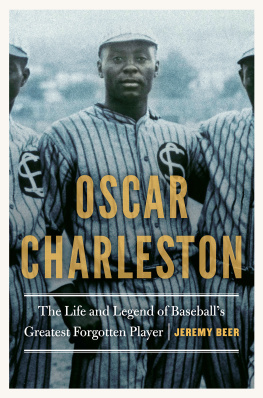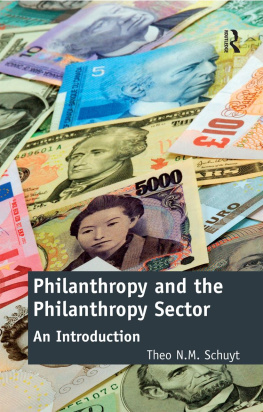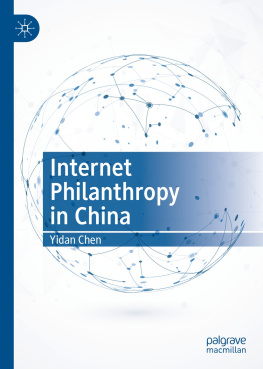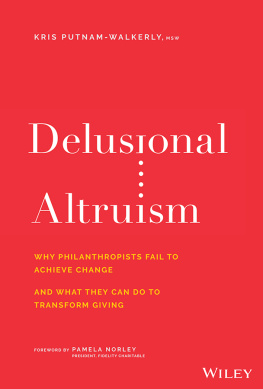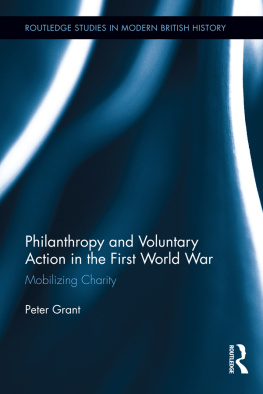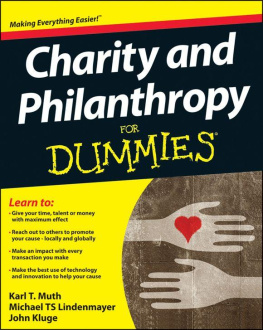Copyright 2015 University of Pennsylvania Press
All rights reserved. Except for brief quotations used for purposes of review or scholarly citation, none of this book may be reproduced in any form by any means without written permission from the publisher.
Published by
University of Pennsylvania Press
Philadelphia, Pennsylvania 191044112
www.upenn.edu/pennpress
A Cataloging-in-Publication record is available from the Library of Congress
Cover design by John Hubbard
ISBN 978-0-8122-4793-0 hardcover
ISBN 978-0-8122-9247-3 ebook
In this book, I argue that the shift from charity to philanthropy as the preferred framework for understanding the voluntary use of private resources to benefit others has had surprisingand mostly overlookedsignificance. Most fundamentally, this shift has been the result of a reconceptualization of voluntary giving as primarily a tool for social change.
Until the nineteenth century, to engage in charity had been for nearly all Americans to affirm, if only implicitly, particular theological claims arising out of traditional Judaism and Christianity. With the rise of philanthropy, the nature of these theological claims changed dramatically. They became bound up with the attempt to assert technological mastery over the social world. Philanthropy has thus served at once as a technique for and a manifestation of revolutionary changes in American life, including secularization, centralization, the bureaucratization of personal relations, and the relative devaluing of locality and place.
I do not argue that charity is religious whereas philanthropy is secular: both are associated with certain theological presuppositions, not only in the most fundamental sense that there is no escaping such presuppositions, but also in the historical sense that philanthropy arises out of a reimagining of Christian eschatology and the proper role of Christianity in society. Nor do I argue that charity is more effective than philanthropy: effectiveness, of course, can only be assessed with respect to specific ends, and with respect to its own fundamentally technological ends, philanthropy is clearly more effective than charity (although perhaps not as effective as its practitioners sometimes claim). Philanthropys proponents, however, have usually failed to acknowledge that traditional charitys ends are quite different from its own. We are talking about two different things.
I do argue that charity is uniquely associated with certain goodswe might call them personalist goodsthat are largely unavailable to or tend to be undermined by philanthropy on its own terms, and that insofar as we value those goods, we must look to inject the logic of charity into the modern practice of philanthropy. The halfway-tongue-in-cheek term I assign to this modified, charity-inflected form of philanthropy is philanthrolocalism.
In any case, this is an episodic, illustrative, and extremely brief account of why the denigration of charity and the concomitant rise of philanthropy are part of an underappreciated chapter in the American story. My limited goal in this book is to suggest a line of interpretation that has not often been given voice, in the hope that it will prove fruitful to those who carry out more detailed and scholarly investigations.
No one has written more intelligently on modern philanthropy than William Schambra, formerly director of the Bradley Institute for Philanthropy and Civic Renewal at the Hudson Institute. I do not wish to burden him with my own mistakes and opinions, but it is nonetheless the case that this book is thoroughly permeated by what I have learned from Bills important writing. Whatever is worthwhile here is due to his influence and example. Along with his many other contributions, Bill directed me to the work of Benjamin Soskis, whose historical insights have significantly shaped my own thinking. One neednt be a very attentive reader to detect that there is little original scholarship contained in these pages, so I would like to express my gratitude to Ben and all the other scholars on whose work this account depends, even as Im sure they would frequently, perhaps vehemently, disagree with my arguments and conclusions.
I have learned much about the challenges and possibilities presented by contemporary philanthropy from my observations of and conversations with Howard Ahmanson, Wick Allison, Fred Clark, Scott McConnell, George ONeill Jr., Greg Pfundstein, Tom Riley, and Jon Basil Utley. My colleagues at American Philanthropic and Philanthropy Daily have all provided assistance in various ways throughout this project, especially Jeff Cain, Matt Gerken, and Liz Palla. Damon Linker, my fine editor at the University of Pennsylvania Press, helped shape this books argument into something approaching coherence. The editors of Communio allowed me to reprint some of the text that originally appeared in Satan Was the First Philanthropist, Communio 41 (Fall 2014). And my wife, Kara, patiently listened to my rehearsal of the arguments made herein and helped sharpen my thinking about them. My hearty thanks to all.
Whats Missing from the Story of American Philanthropy
[O]ne of the serious obstacles to the improvement of our race is indiscriminate charity. It were better for mankind that the millions of the rich were thrown into the sea than so spent as to encourage the slothful, the drunken, the unworthy. Of every thousand dollars spent in so-called charity today, it is probable that nine hundred and fifty dollars is unwisely spentso spent, indeed, as to produce the very evils which it hopes to mitigate or cure.
Andrew Carnegie
The Western Soup Society was established by an anonymous group of benefactors in Philadelphia in 1837. Its mission, to help relieve the plight of the poor, was simple, and its method, the establishment of a soup kitchen on Philadelphias west side, just as basic. Fifteen thousand quarts of soup were ladled out to all comerslocal or transient, black or whiteduring the winter of 183738. Potatoes and rice were added to the menu in 1842, and in 1845 a local philanthropist named Paul Beck left the society a substantial bequest that allowed it to expand further its service to the poor, including the addition of a lunch program for black students at a nearby school.
Except, perhaps, for its precociously interracial nature, there was little about the societys charitable work that was atypical for its time. Thousands of soup kitchens and similar outdoor relief programs operated in cities and towns across America in the first half of the nineteenth century, brought into being not only by the severe dislocations produced by a burgeoning industrial economy but also by Americans relatively newfound enthusiasm for the establishment of voluntary, nongovernmental associations aimed at helping those in need.
Yet by the 1830s and 1840s, such associations increasingly found themselves the targets of criticism. Critics accused groups like the Western Soup Society of encouraging idleness and vice by indiscriminately feeding the unworthy and the lazy. These critics wished to eliminate the sort of outdoor relief practiced by the Western Soup Societies of the nation and to replace it with almshouses, workhouses, and asylums: so-called


